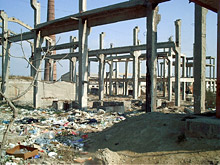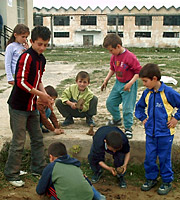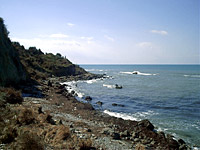Porto Romano. It sounds like the name of a fancy seaside resort. Yet in 2000, it was identified by the United Nations Environment Programme (UNEP) as "an environment disaster area" and "one of the worst environmental hotspots of the Balkans". The agency called for urgent action to prevent further damage to the environment and said people in the area should be resettled. Nothing was done.
Located near Durres, Albania's main port on the Adriatic Sea, Porto Romano is the site of an abandoned chemical plant that produced a toxic insecticide called Lindane (gamma-HCH) and sodium chromate for use in the leather tanning industry. When the plant was closed in 1990 following the collapse of the communist regime, dangerous concentrations of hazardous chemicals were left in the former factory, on a dumpsite, and in hundreds of rusty drums and perforated bags in a nearby warehouse. There is not even a fence or warning sign around the site. The 5000 people who live in Porto Romano do not realize they are living on an ecological time bomb.
Vera, a mother of two, says she and her husband moved to the old chemical factory site ten years ago after losing money in Albania's infamous pyramid schemes. Both her kids were born here. "We have lots of problems because of the wind and poison here, but there is no other place for us to go." She says the authorities told her they would be moved, but she does not know where. When the wind blows from the wrong direction, one can smell the musty odour of Lindane, now widely banned in Europe because it is believed to be carcinogenic. Children play on the site. At one spot, soil samples were found to consist of 70 percent of Lindane and only 30 percent soil. At other places on the site, levels of hexavalent chromium, or chromium-VI - a chemical whose toxicity was exposed in the popular film Erin Brockovich - exceeded critical German levels by up to 100 times. Contaminated material was also used to build a road nearby.
Bad food On just a few square kilometres, Porto Romano embodies Albania's recent history. In his drive for self-reliance, communist dictator Enver Hoxha set up heavy industry using obsolete technology, with no concern for safety, the environment, and in this case, for proper disposal of waste and unused chemicals. When the industry collapsed along with the communist regime, political chaos ensued and industrial sites like this one were left unattended and were looted. People who were no longer forced to live in inhospitable rural communities and had lost their fortunes in the pyramid schemes moved to urban centres like Durres in search of better lives.
Miracles and governments A doctor who runs a tiny clinic overlooking the remains of the old factory says he sees many people with unusual skin and respiratory problems, but he says he is not equipped to perform elaborate tests. "A group of German doctors took samples of blood, urine and mother's milk," he says. "They took the samples to Germany, but they did not send the results." He does not know how his patients are affected by exposure to the chemicals. "They have a long-term effect, perhaps in the liver or the bone marrow." No one knows exactly how more than ten years of constant exposure to toxic chemicals and contaminated groundwater has affected the people's health. A local environmental official describes the situation in Porto Romano as a big experiment on how long people can survive with high dosages of chromium and Lindane. Relocation The next phase will be to prevent further leakage of toxic material to the environment. The chemicals will be stored and the site will be sealed off with a thick concrete wall.
"Porto Romano is a very dangerous hotspot, because it is very close to the sea," says Albania's Environment Minister Et'hem Ruka. As the factory was built on a wetland area, the contamination is slowly spreading through the eco-system, through a drainage system that pumps surface water from Porto Romano into the Adriatic during the rainy season. It is not known how badly marine life has been affected. However, contamination levels in snails and mussels taken at the site and downstream were found to be 15 times higher than levels tolerated in Germany. A third part of the operation will be to make an inventory of the approximately 600 tonnes of chemicals found in corroding steel barrels and torn sacks at the storage facility, three kilometres from the factory. What cannot be destroyed will be repackaged and removed, and finally the site will be decontaminated. This will not be an easy task, as according to UN guidelines, the materials present a "high danger potential" due to their high toxicity and inflammability, which pose a risk of explosion. The plan provides for constant monitoring of the process by local and international environmental experts. Preparatory work has already started and the project is expected to be end in 2007. With total costs estimated at 4.9 million euros, it seems odd that the funds were not made available earlier. Potential damage The environment minister appears determined to obtain results in Porto Romano. This year thousands of Albanians went out on the streets in protest at government plans to import waste from Italy, appalled at the prospect of their country becoming the "trash can of Europe". The government desperately needs to improve its dismal environmental record both at home and abroad. It does not have the funds or expertise to handle this ecological time bomb on its own, so it will continue to depend on help from the international community. After Porto Romano, there will be more hotspots to clean up.
|


 A pesticide and Persistent
Organic
A pesticide and Persistent
Organic
